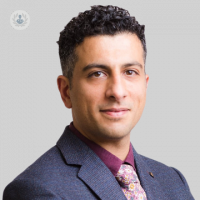What is the procedure and recovery time for cataract surgery?
Written in association with:Cataracts, a clouding of your eye's natural lens, is very common, is typically age-related and comes on very gradually. Although they can cause poor vision, cataracts are easily treatable. To hear more about cataract surgery, we invited esteemed consultant ophthalmic surgeon Mr Danny Mitry to share his expert insight on the topic.

Who is likely to develop cataracts?
The vast majority of cataracts are age-related, occurring in later life, but they can present from the age of fifty onwards. Very occasionally, younger people can develop cataracts but that is very rare indeed. In nearly all cases, cataracts develops in older age and the symptoms tend to get worse as we get older.
What are the symptoms of cataracts?
The symptoms of cataracts are quite non-specific and the condition develops very gradually. Normally, patients experience blurring and haziness of the vision, with glare in bright lights and sunlight. One of the first symptoms of cataracts that people tend to notice is an onset of difficulty with driving at night because of the glare from oncoming headlights. There are some other symptoms relating to near vision and close work or reading can become difficult, even in bright light.
The decision as to when to have surgery is individual and depends on the person's age and lifestyle demands as visual requirements differ from one patient to the next. People of working age may require very good detail vision with computers, for instance while retired people may engage only in light reading or playing golf, and as such their visual requirements would be very different.
What happens during cataract surgery?
The same procedure is used for all cataract patients and involves using ultrasound energy to dissolve the cataracts so they can be sucked out of the eye through a very small incision. The clouded lens is then replaced with a folding lens implant that is inserted into the eye and expands to its normal shape once in place.
Nowadays, a laser approach is also available for treating cataracts, however, it is not a comprehensive solution and the evidence to date suggests that it doesn't significantly improve the outcomes achieved by other, already established, treatment methods.
What is the recovery period like following cataract surgery?
One of the best things about cataract surgery is that the recovery is generally very quick. In a matter of days, you will have reasonably good vision after the surgery. Initially, the most immediate results can be disappointing because the vision is often bright and blurred as the pupil is still dilated and the eyes are slightly inflamed. However, this generally settles down very rapidly. You will need to take eye drops for about a month after surgery. Over the first few days after surgery, your vision will improve significantly.
If you require cataract surgery and wish to schedule a consultation with Mr Mitry, you can do so by visiting his Top Doctors profile.


